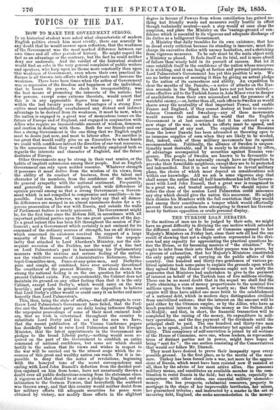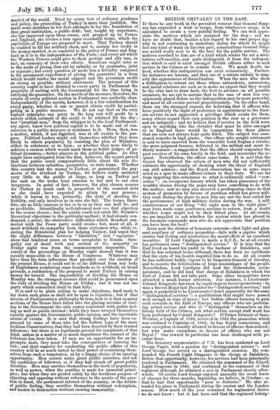THE TURKISH LOAN DEBATES.
Jr the motives of men are to be judged by their acts, we might have no great difficulty in divining the one motive which actuated the different sections of the House of Commons opposed to her Majesty's Ministers on Friday. last, since their acts all had the one result of showing that not a single section represented in the divi- sion had any capacity for appreciating the practical questions be- fore the House, or for becoming masters of "the situation." We ought to infer from their acts that their purpose was to prove, by a process of exhaustion, that her Majesty's Ministers constituted the only party capable of carrying on the public affairs of this country. One hundred and thirty-two gentlemen of various po- litical opinions took some pains to explain the grounds upon which they agreed that the House of Commons ought not to ratify the guarantee that Ministers had undertaken to give to the payment of interest on behalf of the Turkish loan of five millions sterling. There can be no moral doubt that in the sequel we shall find the Porte obtaining a sum of money proportionate to the nominal five ' millions upon the terms named, or nearly so; • that the Ottoman empire will thus have added one more brick to the establishment of a national debt, which in modern days distinguishes civilized from uncivilized nations; that the interest on the amount will be paid either by the Ottoman empire, or by the Allies, who have as much practical interest in raising the money as the Sultan AM- ul-Medjid ; and that, in short, the financial transaction will be completed by the raising of the money, its expenditure in mili- tary operations, and the due payment of the dividends until the principal shall be paid. The one hundred and thirty-two men have, so to speak, joined in a Parliamentary bet against all proba- bility. This conspiracy of self-conviction isjoined by all sections of the House of Commons, save one, whose leaders, as representa- tives of distinct parties not in power, might have hopes of being " sent for"; the one section consisting of the Conservatives that would not follow Mr. Disraeli.
They must have desired to prove their incapacity upon every possible ground.. In the first place, as to the merits, of the mea- sure. Turkey has been forced into a war, not more by the aggres- sions of Russia, which must have been resisted now if resisted at all, than by the advice of her most active allies. She possesses military means, and constitutes an available member in the com- bination to resist Russia in the field; but she wants, especially in comparison with other states, one essential military element— money. She has prospects, substantial resources, property to mortgage in the shape of her improveable territories, her mines, her guaranteed tributes ; and instructed by a master in the art of incurring debt, England, she seeks accommodation in the money-
market of the world. Tried by every. test of ordinary prudence and policy, the proceeding of Turkey is more than Justified. She made some mistakes in her first attempts to lay the foundation of that great institution, a public debt; but, taught by experience, she has improved upon these errors, and, propped up by France and England, she invites a lOan upon reasonable terms, which the capitalists of Europe are prepared to meet. That Turkey should be enabled to fill her military chest, and to sustain her credit in the money-market, is as essential to the policy of France and Eng- land as it is to the independence of the Porte ; and every aid which the Western Powers could give to their protagé and ally was, in fact, an economy of their own efforts. Questions might arise as to the mode of giving that aid by subsidy, or by guarantee, joint or separate; but every question of mode was a trivialty compared to the paramount expediency of giving the guarantee in a form which would render the moral support and the pecuniary credit as strong as possible, without abatement. The interest of this country ought to have dictated to every party in Parliament the propriety of uniting with the Government for the time being in ratifying the guarantee. On the merits of the measure, therefore, the course of every political section in Parliament was perfectly clear. Independently of the merits, however, it is a fair consideration for every party, whether it can or cannot obtain credit by partici- pating in a public: measure. We do not say that on the very highest principles any party in the long run will profit by a merely selfish estimate of the credit to be attained for the day ; but "practical men," from the whipper-in to the local Parliament- ary agent, know how political capital is to be made out of con- currence in a public measure or resistance to it Here, then, was A motive, which, if not dignified, was at all events to the pur- pose. Political leaders might .ask themselves whether they were likely to attain popularity by resisting the plan of Ministers, either in substance or in form; or whether they were likely to achieve a success which would mark them as better judges of po- litical dynamics —better players in the political game. As they might have anticipated from the first, however, the sequel proved that the public cared comparatively little about the nice dis- tinctions between subsidies, guarantees, or state loans. Whether this country lent the money to Turkey, or guaranteed the pay- ments of the dividend by Turkey, we believe really mattered very little to the public at large, so long as Turkey got the cash on the terms least onerous to her and to our own taxpayers. In point of fact, however, the plan chosen secures for Turkey as much cash in proportion to the nominal debt as she could have expected to attain by any process ; while it leaves to her, primarily, the duty of meeting the liability, and only involves us in case she fail. The terms, there- fore, are as little onerous to her or to us as they can well be, and as profitable. Scientifically well-informed men can find objection to the course chosen ; but the public could not catch Mr. Ricardo's theoretical objections to the particular method ; it had already con- demned, a priori, the obstructive difficulties which Members con- nected with the Peace party could create ; but, most of all, it must withhold its sympathy from those statesmen who, while re- sisting the Ministerial plan for helping Turkey, had urged that the slight differences between " limitation " and " equipoise " alone had hindered peace on terms acceptable to Russia. Sym- pathy out of doors with any section of the minority on Friday night was from the commencement impossible. The result of the proceedings on Monday night showed that it was equally impossible in the House of Commons. Whatever may have been the false influences that presided over the election of the present House, it could not be so far different from any body of Englishmen numbering some hundreds as to withhold, on broad grounds, a ratification of the proposal to assist Turkey in raising money for herself. The impossibility of dividing the House on Monday was .the strongest censure that could be pronounced upon the folly of dividing the House on Friday ; but it was not one party which committed itself to that folly.
It is said to be plain sailing to make objections, hard work to lay down such plans as shall not be open to objection ; but if that maxim of Parliamentary philosophy be true, how is it that so many sections of the House have fallen into the glaring mistake of leav- ing to the Government the only course consistent with public feel- ing as well as public interest ; while they have arrayed themselves equally against the Government, public opinion, and the inevitable course of events. It is said that strong feelings have been ex- pressed by some of those who led the forlorn hope of the more reckless Conservatives, that they had been deserted by their trusted followers ; but there is no legitimate ground for complaints of that kind, unless in a matter of so much importance the counsel of the followers has been taken. If men see an opportunity for an im- promptu dash, they must take the consequences of running the risk; and their capacity for conducting the public affairs of this
country will be as much tested by their power of restraining them-
selves from such a temptation, as by a happy choice of an opening opportunity. Men cannot make great public mistakes, and ask the confidence of followers as if they had struck off great public felicities. Men may sacrifice themselves in the teeth of popularity, as well as power, when the sacrifice is made for immortal princi-
ples; but when they are guided solely by the invidious purpose of objecting and opposing without reference to the merits of the ques- tion in hand, the permanent interest of the country, or the dictate of public feeling, they sacrifice themselves without redemption, and hasten to destruction without earning immortality.



























 Previous page
Previous page